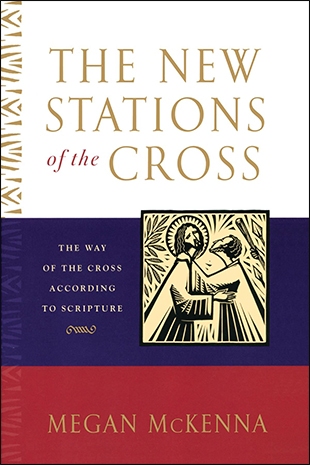For over 400 years, Christians have gone to Jerusalem to walk the Way of the Cross from the Garden of Olives, to the High Priest's house and courtyard, to Pilate's residence and the Praetorium, through the city to the hill of Calvary and then, at last, to the tomb. Other devotional believers have found sites in their communities to stand in for the stations as emblems of the sin, violence, injustice and separation of modern times. In this insightful resource, Megan McKenna presents the 14 new Stations of the Cross instituted by Pope John Paul II, dropping the ones that are not in the Scriptures and adding others from the Gospel accounts. She notes: "The Stations of the Cross are a compass, a guide for the heart, a blueprint, and a source for sounding out our responses to what prevails and happens in our world today. They offer wise counsel on how to walk with dignity, with grace, with compassion, and with the freedom that the children of God have, no matter what we encounter along the way."
The 14 Stations of the Cross are: Jesus prays in the Garden of Olives; Jesus is betrayed by Judas; Jesus is condemned to death by the Sanhedrin; Jesus is denied by Peter; Jesus is judged by Pilate; Jesus is scourged and crowned with thorns; Jesus carries his cross; Jesus is helped by Simon of Cyrene; Jesus encounters the women of Jerusalem; Jesus is crucified; Jesus promises to share his reign with the good thief; Jesus is on the cross, with his mother and disciple below, Jesus dies on the cross; and Jesus is placed in the tomb. McKenna provides the Scripture readings that the Catholic church has designated to accompany each station along with her own solid and substantive interpretation of each of these events. She also meditates on a 15th station, Holy Saturday and Easter Resurrection.
Here is an example of one of her readings: " We are horrified when we think of what was done to Jesus but are we equally horrified when this is done to others? Jesus was alone, without protection, defense or recourse, as are so many hundreds of thousands of human beings today. These atrocities are practiced in the world today, in prisons, interrogation centers, among governments and groups so angry and frustrated that they engage in torture and destruction as a way of dealing with their political and economic situations. We haven't found ways to stop such practices. We have groups like Amnesty International and Human Rights Watch and Pax Christi that seek to speak of what is happening, to keep the public aware of the horrors that occur routinely in the name of democracy and homeland security."
The challenge of those participating in this ritual is to bring its rich meanings to bear on contemporary life both here and abroad. McKenna's illustrative material is thought-provoking and soul-stirring. As she has proven in her many other books, she is a master educator.
